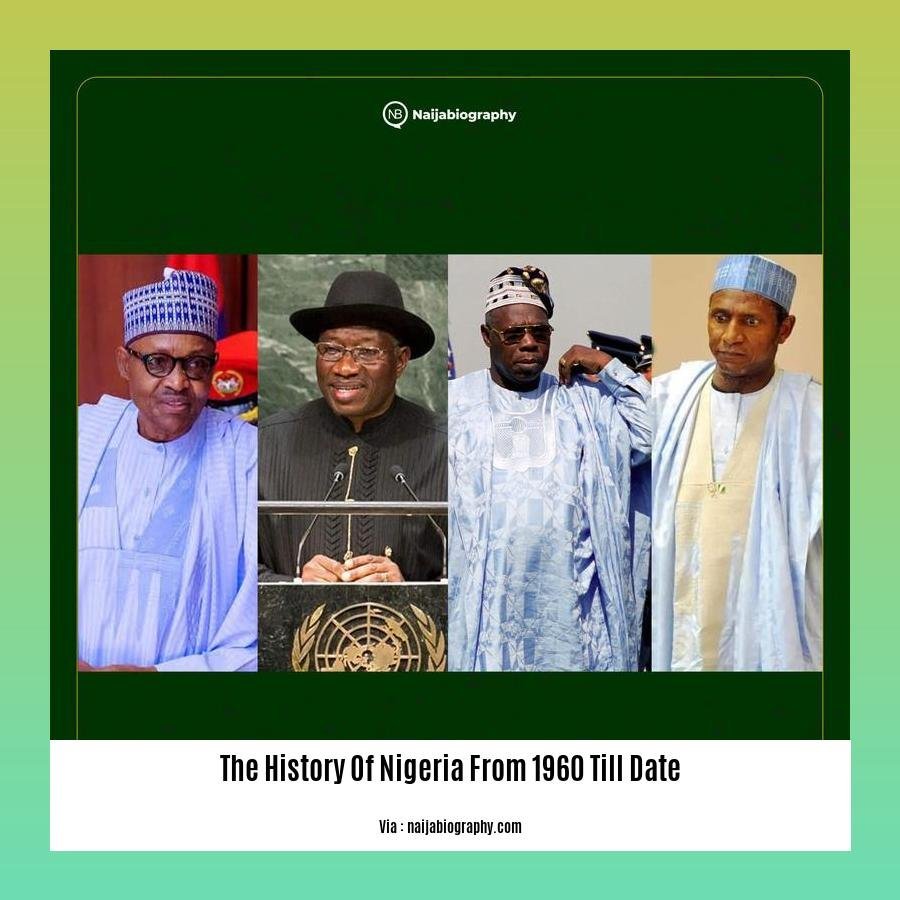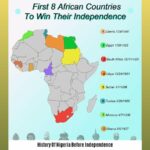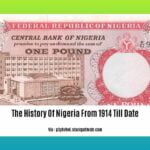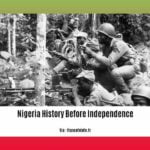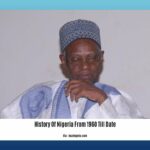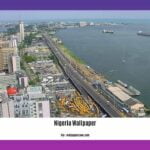Immerse yourself in the captivating narrative of Nigeria’s remarkable transformation since its independence in 1960 in our article titled “A Journey Through Six Decades of Transformation: The History of Nigeria from 1960 Till Date.” Experience the nation’s triumphs and travails as it navigated the complexities of politics, economics, and culture to emerge as a vibrant and influential player on the global stage.
Key Takeaways:
Nigeria gained independence from British colonial rule in 1960.
The new constitution established a federal system and an elected prime minister.
Political instability and ethnic tensions led to several military coups in the 1960s and 1970s.
The Nigerian Civil War, which lasted from 1967 to 1970, resulted in over 1 million deaths.
Nigeria’s first democratic elections in 1979 brought Alhaji Shehu Shagari to power.
Military rule resumed in 1983 and lasted until 1999, when democratic elections ushered in President Olusegun Obasanjo.
The History of Nigeria from 1960 Till Date
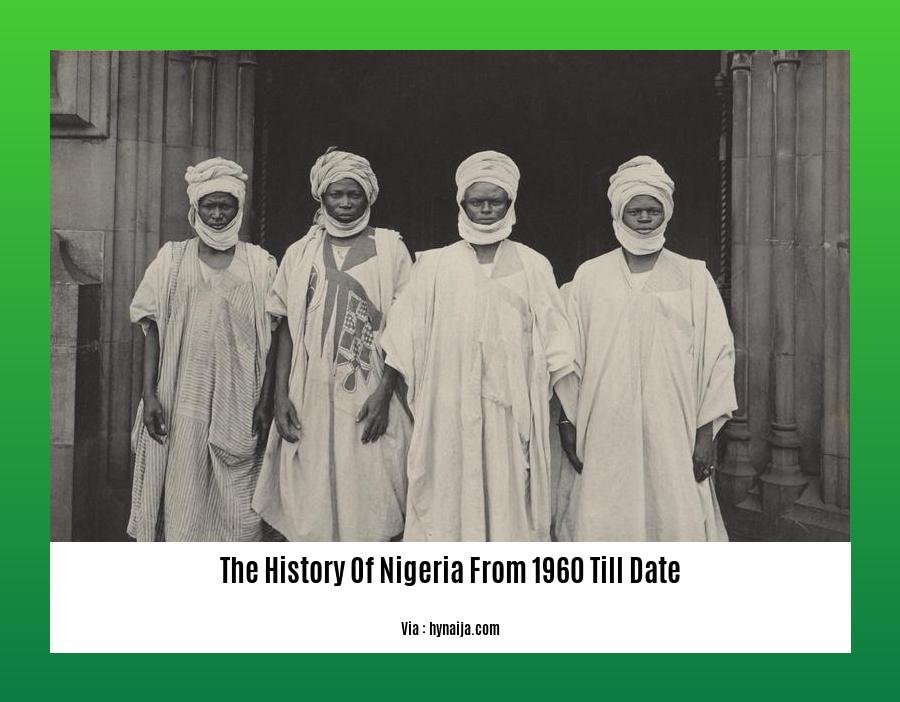
From a British colony to a vibrant republic, Nigeria has been through a series of changes since its independence in 1960, making its history a kaleidoscope of ups and downs.
The Euphoric Dawn: From Colony to Independence
On October 1, 1960, amidst the exhilarating echoes of freedom, Nigeria shed the shackles of British colonialism. The new nation embarked on a journey of self-governance, draped in the colors of its own flag and imbued with the hopes of its people. A federal system was established, marking the beginning of a new era.
Tumultuous Tides: Coups, Civil War, and the Struggle for Stability
The 1960s and 1970s were marred by a series of military coups and counter-coups, reflecting the nation’s struggle to find its footing. In 1967, the wounds of ethnic tensions festered into a civil war, which lasted three agonizing years, leaving over a million lives lost.
A Glimmer of Democracy: The Shagari Era
In 1979, Nigeria took a leap of faith, embracing democracy once again. The first democratic elections since independence ushered in Alhaji Shehu Shagari as the president. However, the experiment with democracy was short-lived.
Under the Military’s Grip: The Return of Military Rule
In 1983, the military once again seized power, citing political instability and corruption as reasons. The military’s grip on power lasted until 1999, shaping the course of Nigeria’s development during those years.
Nigeria’s Democratic Renaissance: Obasanjo and Beyond
In 1999, Nigeria returned to democratic rule, with Chief Olusegun Obasanjo at the helm. This marked a significant turning point in Nigeria’s history, ushering in a period of relative stability and economic growth.
The Challenges of Today: Corruption, Security, and Economic Disparities
Despite the progress made, Nigeria continues to face challenges, including corruption, security issues, and economic disparities. However, the resilience and determination of the Nigerian people shine brightly, offering hope for a brighter future.
A Legacy of Transformation: The Nigeria’s Journey
From the euphoria of independence to the challenges of today, Nigeria’s journey over the last six decades has been a testament to its resilience, diversity, and the indomitable spirit of its people. As Nigeria navigates the complexities of the 21st century, its history serves as a compass, guiding it towards a future of unity, progress, and prosperity.
The Landmark Moments that Shaped Nigeria’s Journey:
- 1960: Nigeria gained independence from British colonial rule.
- 1967-1970: A civil war, fueled by ethnic and regional tensions, ravaged the country.
- 1979: Nigeria’s first democratic elections were held.
- 1983: The military seized power in a coup d’état.
- 1999: Nigeria returned to democratic rule after 16 years of military dictatorship.
The Challenges Nigeria Faces Today:
- Corruption: Corruption remains a pervasive problem, hindering development and perpetuating inequality.
- Security: The country grapples with security threats, including terrorism, banditry, and kidnappings.
- Economic Disparities: Despite its vast resources, Nigeria struggles with income inequality, poverty, and unemployment.
Nigeria’s Future: A Glimmer of Hope
Despite the challenges, Nigeria’s future holds promise. The country’s vibrant youth population, its rich cultural heritage, and its vast natural resources provide a foundation for sustainable growth and development. With continued efforts to tackle corruption, insecurity, and economic disparities, Nigeria can harness its potential and emerge as a prosperous and united nation.
Wondering how Brazilian jiu-jitsu became a renowned martial art? Click to find out the history of Brazilian jiu jitsu.
Curious about the historical developments from 1914 to the present in Nigeria? Read about the history of Nigeria from 1914 till date.
Need a comprehensive overview of key events in Indian history from 1600 to 1947? Check out this timeline of Indian history from 1600 to 1947.
Want to explore the milestones and significant moments in the modern history of India? Dive into this informative timeline of modern history of India.
Return to Civilian Rule (1979-1983)
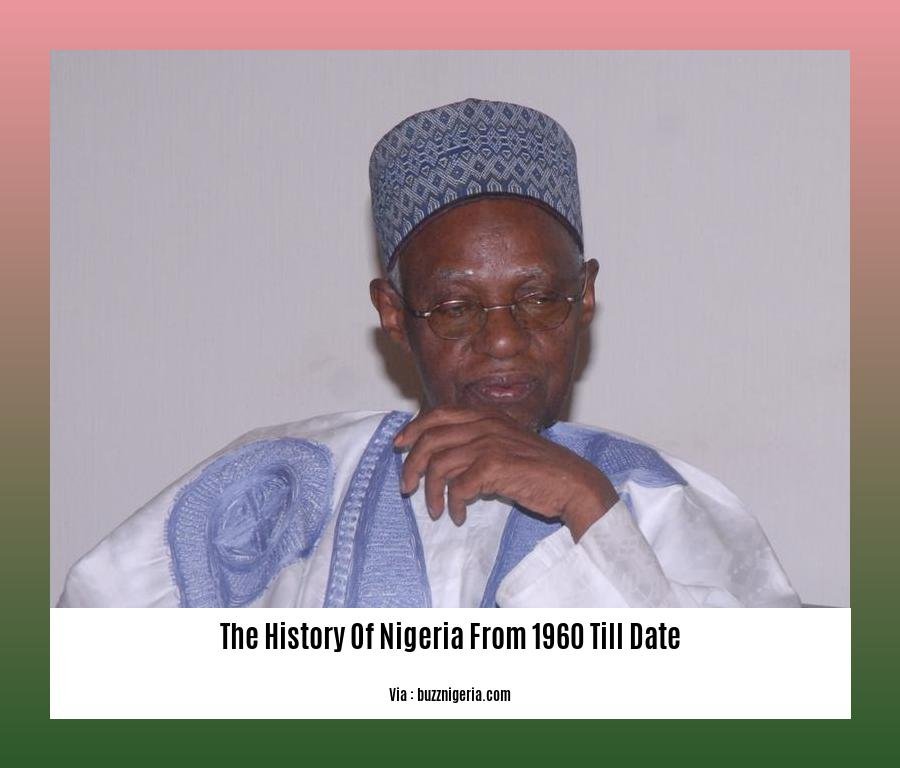
Can you imagine how it felt for Nigerians in 1979 when the military finally agreed to a fair and just democratic election? The people were thrilled as they dashed to polling stations to elect their own leader. That year, Alhaji Shehu Shagari of the National Party of Nigeria (NPN) emerged as the first democratically elected president of Nigeria.
The transition from military rule to civilian rule was a massive success for several reasons:
- Zero Coup Attempt: During the four years of Shagari’s presidency, there wasn’t a single military intervention. People could finally breathe a sigh of relief!
- Freedom of Press: For the first time in a long time, Nigerians enjoyed the freedom to express their thoughts and opinions without fear of persecution. The media flourished, and critical voices could finally be heard.
- Economic Progress: The economy flourished under Shagari, thanks to increased oil revenues. The nation’s GDP grew steadily, and Nigerians’ standard of living improved.
However, not everything was rosy in the land. Despite the economic growth:
- Corruption: Rampant corruption was chipping away at the nation’s coffers, slowly undoing the economic gains.
- Ethnic and Religious Divisions: Old ethnic and religious fault lines that had plagued Nigeria since independence resurfaced, threatening to tear the nation apart.
- Economic Disparities: The wealth wasn’t trickling down equally. While some Nigerians enjoyed the economic boom, others remained in poverty, feeling left behind.
In 1983, the military, led by General Muhammadu Buhari, seized power through a coup. They accused the civilian government of corruption and incompetence. And thus, the experiment with democracy was short-lived, paving the way for another era of military rule.
Key Takeaways:
- Return to Democracy: In 1979, Nigeria held its first democratic elections after years of military rule.
- Shagari’s Presidency: Alhaji Shehu Shagari of the NPN won the election and became the first democratically elected president of Nigeria.
- Economic Success: The economy flourished under Shagari, with GDP growth and improved living standards.
- Challenges: Corruption, ethnic tensions, and economic disparities persisted during Shagari’s presidency.
- Military Coup: In 1983, the military seized power again, citing corruption and incompetence of the civilian government.
References:
Nigeria’s Transition from Military to Civilian Rule in 1979: An Analysis
Nigeria: A Country Study
**Military Rule and Economic Reforms (1984-1999)**
Brace yourselves for a journey through the tumultuous decades of military rule and economic experiments in Nigeria. It was a time of stringent governance, ambitious reforms, and a persistent struggle for democratic ideals. Join us as we delve into this crucial chapter of Nigeria’s history.
Key Takeaways:
The military regime took power in 1985, promising to combat corruption and economic mismanagement, but it soon faced challenges in implementing effective reforms.
The introduction of the Structural Adjustment Program (SAP) in 1986 aimed to stabilize the economy, but it led to significant economic hardship and social unrest.
The regime’s attempts to diversify the economy away from oil dependence and promote non-oil exports had limited success, as oil remained the dominant source of revenue.
The military government faced increasing pressure from civil society groups and international organizations to democratize, leading to the transition to civilian rule in 1999.
Economic Reforms Under Military Rule:
The Structural Adjustment Program (SAP), introduced in 1986, aimed to reduce government spending, deregulate the economy, and promote exports.
The SAP led to the privatization of state-owned enterprises, the devaluation of the currency, and the removal of subsidies on essential commodities.
The reforms resulted in a decline in government revenue, increased unemployment, and widespread poverty.
Despite the economic challenges, the military government made some progress in promoting non-oil exports, particularly in agriculture and manufacturing.
Challenges to Economic Reforms:
The collapse of global oil prices in the late 1980s and early 1990s significantly reduced Nigeria’s export earnings, making it difficult to implement economic reforms.
The military government’s heavy reliance on the military and security apparatus to maintain power led to increased human rights abuses and a decline in public trust.
The lack of transparency and accountability in the implementation of economic reforms led to corruption and mismanagement.
The military government’s failure to address the root causes of Nigeria’s economic problems, such as corruption and weak institutions, limited the effectiveness of economic reforms.
In 1999, after 15 years of military rule, Nigeria transitioned to civilian rule with the election of President Olusegun Obasanjo. The military era left a mixed legacy, with some economic progress but also significant challenges that the new democratic government had to address.
Sources:
Democratic Consolidation and Challenges(1999-Present)
Nigeria’s democratic journey since 1999 has been a roller coaster ride, marked by milestones and setbacks. The return to civilian rule in 1999 ushered in a new era of hope and optimism, but the country has faced numerous challenges in consolidating its democracy.
Key Achievements:
Fourth Republic: The Fourth Republic, which began in 1999, is the longest-lasting democratic dispensation in Nigeria’s history.
Power Rotation: The peaceful transfer of power between political parties and regions, promoting inclusivity and stability.
Freedom of Expression: Enhanced freedom of speech and press, allowing for more open dialogue and public scrutiny.
Civil Society Participation: Increased involvement of civil society organizations in governance and advocacy.
Electoral Reforms: Efforts to improve the electoral process, including the introduction of electronic voting in some elections.
Challenges:
Electoral Fraud: Irregularities, violence, and vote-buying continue to undermine the integrity of elections.
Weak Institutions: Weak political institutions and lack of accountability hamper democratic consolidation.
Corruption: Endemic corruption undermines governance and public trust.
Poverty and Inequality: Persistent poverty and income inequality exacerbate social tensions and hinder development.
Ethnic and Religious Conflicts: Ethnic and religious conflicts, often fueled by political manipulation, pose a threat to national unity.
Gender Inequality: Limited participation of women in politics and decision-making, despite efforts to promote gender equality.
Conclusion:
Nigeria’s democratic journey has been fraught with challenges, but it has also made significant strides in consolidating democratic institutions and promoting fundamental freedoms. The country’s ability to overcome these challenges and deepen its democracy will determine its future stability and prosperity.
Key Takeaways:
Democratic Transition: Nigeria’s transition to democracy in 1999 marked a significant milestone, ushering in a new era of civilian rule.
Challenges Persist: Despite progress, Nigeria faces challenges such as electoral fraud, weak institutions, corruption, poverty, and ethnic conflicts.
Electoral Reforms: Efforts to improve the electoral process, including the use of technology, aim to enhance the integrity of elections.
Fight Against Corruption: Addressing corruption remains a key priority for strengthening democratic institutions and promoting good governance.
Gender Equality: Increasing women’s participation in politics and decision-making is essential for inclusive and representative democracy.
Sustained Democracy: Nigeria’s ability to overcome these challenges and deepen its democracy will determine its future stability and development.
[Sources]
– Democratic Consolidation in Nigeria: Issues and Challenges
- Democracy and the Challenges of Consolidation in Nigeria’s Fourth Republic
FAQ
Q1: What significant events marked the beginning of Nigeria’s journey as an independent nation?
Q2: How did Nigeria’s political landscape evolve in the years following independence, and what challenges did the country face during this period?
Q3: What were the key factors that led to the outbreak of the Nigerian Civil War in 1967, and what were the consequences of this conflict?
Q4: What were the challenges that Nigeria faced during the military regimes that ruled the country from 1966 to 1979 and from 1983 to 1999?
Q5: What are the notable achievements and remaining challenges of Nigeria’s democratic governance since the Fourth Republic began in 1999?
- Unlock 6000+ words beginning with he: A comprehensive analysis - April 20, 2025
- Mastering -al Words: A Complete Guide - April 20, 2025
- Master Scrabble: High-Scoring BAR Words Now - April 20, 2025
